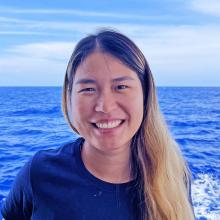
Nina Yang
Tell us about your work/research. What kinds of things do you do?
I am interested in understanding the factors that shape the distribution of organisms in the ocean, from microscopic bacteria to large animals. To do this, I use molecular or ‘omics' tools like environmental DNA and RNA to characterize the members of the biological community and their activity. More and more, we can see and feel the impacts of human activity on the ocean, including plastic pollution and warming ocean temperatures. By studying which organisms are present (biodiversity) and their activity (e.g. function and behavior), we can gauge how life in the ocean responds to these anthropogenic pressures and gain a better sense of whether the ecosystem is healthy and productive.
What sparked your initial interest in your career?
I have always loved the ocean. As a kid, I would go to all the aquariums and museums to learn about the animals that lived in the ocean, but in high school a microbiology course introduced me to a whole new hidden world beneath the waves. These dual interests are the foundation for my current research focus on marine biodiversity.
Who influenced you or encouraged you the most?
A scientific career is extremely rewarding, but sometimes, research and fieldwork requires long hours and hard work. When things get tough, my friends and family are my greatest source of encouragement and support.
What element of your work/study do you think is the most fascinating?
My current focus is on the Ocean Twilight Zone, a region in the ocean where there is very little light. We don’t know much about the organisms that live in this part of the ocean and the role they play in maintaining a healthy ecosystem. Without this information, it is difficult for policymakers to make sound decisions to protect our ecosystems and sustainably manage our ocean’s resources. I am excited to be a part of this ocean exploration effort to see parts of the ocean that have yet to be explored. The data we will gather will play an important role in protecting the ocean.
How did you get involved with the Ocean Exploration Trust?
I work with Dr. Annette Govindarajan who conducts Ocean Twilight Zone biodiversity research at the Woods Hole Oceanographic Institution and is involved with the Ocean Exploration Cooperative Institute.
What other jobs led you to your current career?
Prior to my current position, I was a Sea Grant Knauss Marine Policy Fellow with NOAA Ocean Exploration where I worked on Federal policy issues related to ocean science and technology. This experience gave me a fantastic introduction to ocean policy and opened doors I didn't know existed. After college, I worked for several years in marketing and advertising technology - fields completely different from my biology background. The interpersonal skills I gained working with people of all backgrounds have been invaluable in my science career!
What are your degrees and certifications?
BA in Environmental Biology -- Barnard College 2012; PhD in Biological Oceanography -- University of Southern California 2022; PADI Divemaster
What are your hobbies?
I love scuba diving and also enjoy running, hiking, crocheting amigurumi ocean creatures, and trying all the bubble tea places wherever I go.
What advice would you give someone who wants to have a career like yours?
Gain research experience as early as you can and in various fields. It will help you decide if this is the right path for you. You never know until you give it a try and you undoubtedly learn new skills that will help you in your eventual career.
Expeditions
Nina participated in the following Ocean Exploration Trust expeditions:

